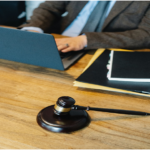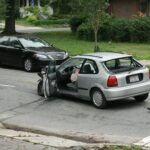Being in a car accident can send your head spinning. All of a sudden, whatever it was that you were going to do when you got in your car becomes irrelevant. You now have to focus intently on what just happened, and lcpalaw.com recommends that you concentrate on two things: taking care of your health and preserving your legal rights. Whatever you do immediately after a car accident will have repercussions in the weeks and months to come. Be prepared by reading the 10 things you have to do after being in a car accident.

1. Check to See If Anyone Is Hurt
Start by knowing that it is important to remain at the scene of an accident, no matter how minor it seems. Then check to see if you, your passengers, or the other driver have suffered any injuries. Call for an ambulance if anyone needs it.
2. Move to Safety
It is also important to make sure no further injuries happen. Do not stand in the middle of the road and get yourself to safety. Depending on the situation involving the crash, you may also have to move the vehicles off the road to avoid getting hit again. If the crash is severe and there are injured people within the cars that cannot be moved, leave the cars where they are and set up emergency triangles or turn on the hazard lights.
3. Call the Police
If the police have not arrived at the scene, call them. Make a note of the police officer’s name and badge number and request a copy of the police report. When questioned, answer politely but avoid speculating on what happened. The police can come to their own conclusions, and you may incriminate yourself.
4. Exchange Information
Get the contact information of the other driver. Find out if the car’s registration is under their name and, if not, the relationship they have with the owner. Ask for their insurance information and write down the vehicle information, including the license plate, make, model, VIN, and year.
Also Read:
- 18 Best Car Gadgets and Accessories for Road Trips
- Top 5 best Fire Extinguisher for Car
- Top 5 Best Blind Spot Mirrors for Car
5. Document the Scene
Take out your phone and take pictures of both cars. If you think a video will capture the scene much better, take one. Make sure to capture the damage to both cars and anything you consider important such as the street name, the condition of the road, the position of the cars relative to the street, and anything else that might have played a role in the accident.
Record or write down the date, time, and location of the accident and anything else you don’t want to forget, such as the weather, visibility, and any other factors that may have contributed to the incident.
6. Interview Any Witnesses
If there was anyone around who witnessed the accident, get their account of the event. Also, write down their contact information. This will come in handy should you decide to file a lawsuit in the future.
7. Avoid Discussions with the Other Driver
You don’t know whether the other driver is impaired or dangerous. Other than their information, avoid engaging in discussions on who was responsible for the accident. Keep in mind that their version and yours might not coincide, and you don’t want to say anything that can later be used to incriminate you.
8. Get Medical Attention
It is normal to feel fine immediately after the accident when your thoughts are scattered and adrenaline flows through your body. However, it is a must to get yourself checked out by a medical professional as soon as possible. You may have internal injuries that may not be obvious, and your insurance will want to know that you take your health seriously. Make sure your doctor documents all injuries clearly in your medical record.
9. Call Your Insurance Company
Let your insurance company know what happened as soon as you can. If you have the police report, share it with them and inform them of the damage to your property and your injuries. They may be covered by your car insurance policy if they result from an accident.
10. Reach Out to an Accident Attorney
You should not be surprised if the insurance denies your claim or gives you a lowball offer that will mean you will not be able to cover your medical and other expenses. Keep in mind that the insurance company will try to convince you to sign documents accepting their first offer, and once you do that, it may be very difficult to reopen the case. Let your attorney negotiate on your behalf and fight to get you the fair compensation you deserve. If you let them take care of the legal side of things, you can concentrate on healing from your injuries and recovering your health.








